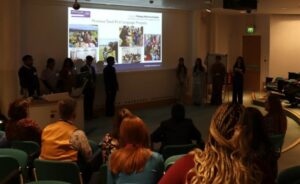The University holds its second Service Learning Conference
 Late last year the University hosted its second Service Learning Conference entitled ‘Perspectives, Partnerships and Practice’.
Late last year the University hosted its second Service Learning Conference entitled ‘Perspectives, Partnerships and Practice’.
With service learning, students go out into communities to undertake practical work and contribute to their overall learning outcomes while providing an important service to local people, benefiting both equally. This helps strengthen the bond between the University and communities, and combines two of our core goals at The University of Manchester – teaching excellence and social responsibility.
During the conference, attendees explored the potential for service learning to become an integral part of the curriculum, the challenges involved and the methods to make it a success.
Encompassing the University’s core strategic goals, service learning ensures social responsibility and civic engagement remains central to the world-leading teaching and learning at Manchester. The transformative initiative allows students to address real-world challenges with their academic knowledge.
Unlike volunteering, service learning is embedded into the University’s curriculum. Students are allocated time to engage in a project with local communities and minority groups, such as delivering educational workshops or providing vital community services.
Beyond developing practical and professional skills, this approach empowers our students to become conscientious global citizens, whilst also addressing the needs of our local communities and fostering positive and mutually beneficial relationships. Can we explain what kind of needs are addressed?
Kick-starting the day were hosts Prof Raj Ariyaratnam and Dr Rachel Lindley, FBMH Co- Academic Leads for Service Learning, who introduced the global Tamil First Language Project. Dentistry students from the University and partners from Manchester Tamil School, spoke about their successful collaboration, running workshops in both Manchester and Sri Lanka to make oral healthcare services more accessible, reducing oral health inequalities.
Throughout the day, attendees were able to participate in interactive workshops, each addressing a specific aspect of service learning, from getting a project off the ground right up to student evaluation. This included an introduction into service learning pilot placements set up by our School of Medical Sciences and an interactive discussion-based workshop, where attendees shared their challenges and successes with service learning, receiving tailored advice from experts in the group.
Healthcare students explored the professional and personal skills they had developed through service learning, giving advice to organisers on how best to keep students engaged. Dr Enam Haque discussed barriers to engaging ethnic communities with service learning initiatives and how to overcome them. Workshops were accompanied by a series of lightning talks, covering a range of fascinating and diverse topics.
Closing the event was Dr Cordelle Ofori, Deputy Director of Public Health at Manchester City Council. Drawing on her experiences as a GP and her work on the Making Manchester Fairer plan, she addressed the impact of service learning in a broader context, highlighting its importance for inclusive involvement and improving health equity.
Reflecting on the day, it was clear that despite coming with its challenges, the positive impact of service learning can be felt far and wide. Attendees left equipped with the knowledge to successfully integrate service learning into their curriculum and overcome any obstacles along the way.
- To find out more about what the Faculty of Biology Medicine and Health are doing on Service Learning go to Service learning | Biology, Medicine and Health | University of Manchester.
